Steam radio: a Baby Boomer's personal memory of post-war wireless comedy
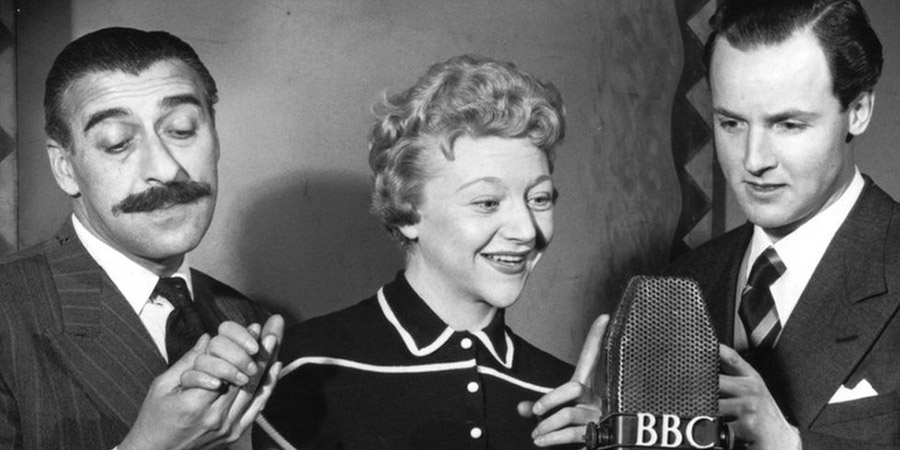
Steam radio - this is what that medium previously known as "the wireless" was affectionately called in the post-war years. No-one seems to know who coined the phrase "steam radio" in the first place - the earliest reference known is from 1951 - but why is pretty much agreed: it was around the time television started to take off, and railway steam engines were being phased out in preference to diesel and or electric; the thought was TV would kill off radio, but conversely it didn't. Instead, radio went from strength to strength, creatively if not in audience numbers.
And it was in about that year, 1951, that I started to listen to radio (no television for us yet - price/availability etc). I would sit on my father's knee as we listened to the likes of...
Much Binding In The Marsh, set on an RAF camp (which my father loved, as he was in that service, man and boy, for 27 years), starred Richard 'Stinker' Murdoch, Sam Costa and Kenneth Horne, with latterly the likes of Dora Bryan, Nicholas Parsons et al. Each week it would open with Horne, Murdoch and Costa singing a song based on the title: "At Much Binding in the Marsh, the..." with words that commented on that week's news. Not that I understood the mild satire - I just laughed when my dad did.
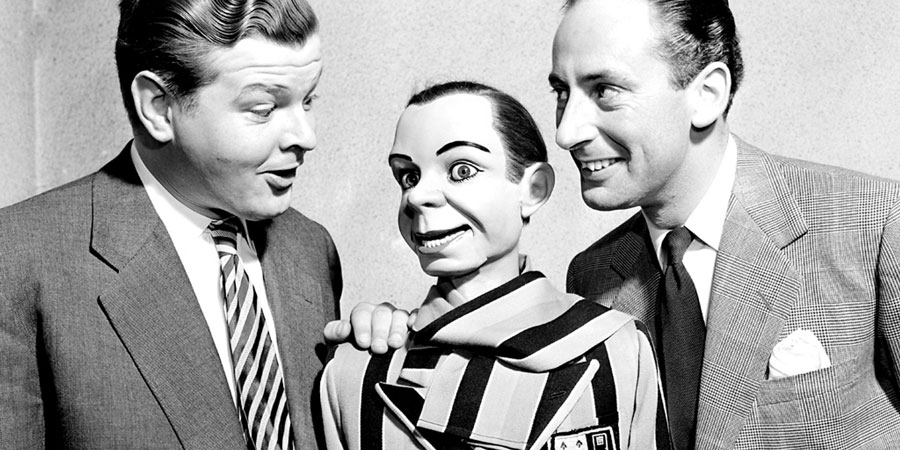
Educating Archie proved ground-breaking for a number of comics trying to get their career off the ground. Usually "employed" to be a tutor to schoolboy Archie Andrews, who was in the ridiculous position of being the ventriloquist dummy of Peter Brough. Yes, on the radio! But that was just as well as Brough was a useless vent, which he admitted. He even filed a V-shape into his two front teeth, thinking it would improve his technique. (It didn't.)
Notably, Tony Hancock co-starred as the tutor in Series 2 as the show gained huge popularity, bearing the catchphrase "Flippin' kids". Other tutors across more than 230 episodes included Benny Hill, Harry Secombe, Dick Emery, Bernard Bresslaw, Hattie Jacques and Bruce Forsyth - together with a young Julie Andrews as Archie's girlfriend, replaced later by Beryl Reid. She would become more famous when she gained her own spot, appearing each week as Monica, with a broad Brummie accent and catchphrase "Good evening, each".
One other notable was Max Bygraves, who appeared from Series 1 and became a tutor later in the show. He had a couple of catchphrases, with "A good idea [beat] son" entering the national consciousness and being widely used to compliment anyone who came up with a good idea at work or at home.
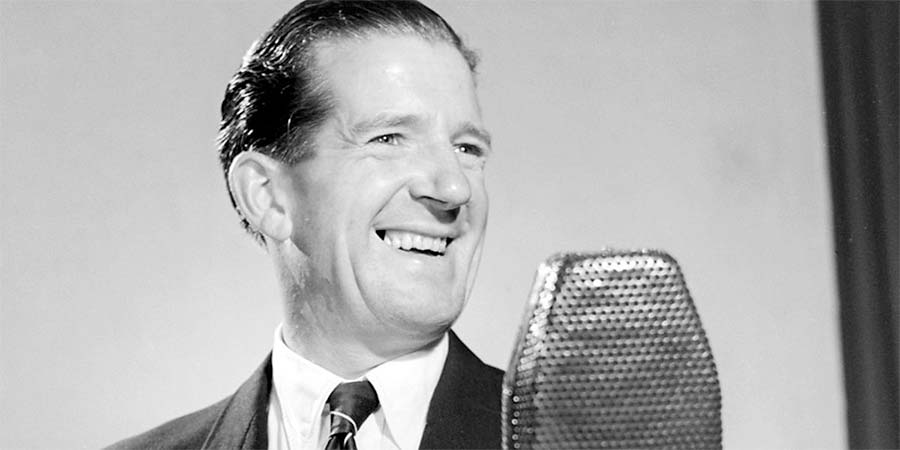
Ray's A Laugh, starring Ted Ray with his radio wife Kitty Bluett, was a simple domestic situation comedy (I still laugh at it today - big fan of Ted) that gained its air-time by filling the gap left when iconic Second World War comedy ITMA (It's That Man Again) abruptly ended on the sudden death of its star, Tommy Handley.
*ITMA (1939 - 1949) was before even my time (!) and spawned a couple of catchphrases of its own. Cleaning lady Mrs. Mopp would invariably ask "Can I do you now, sir?" as she made her entrance into a scene, and "I don't mind if I do" was the regular response of Colonel Chinstrap whenever a drink seemed to be in the offing.
The Al Read Show was extremely popular in the 1950s and 60s, again resulting in a number of catchphrases entering the national lexicon, notably "Right, monkey" and "You'll be lucky - I say, you'll be lucky!". In this remarkable one man show, the eponymous star would deliver his take on contemporary life in short sketches, playing all the parts. His northern husband and wife character duo were always a good laugh.
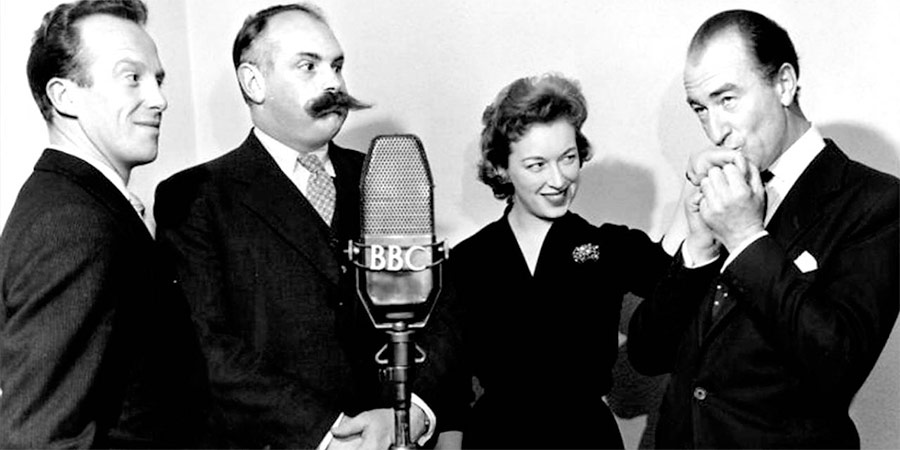
Take It From Here, which ran for 328 episodes over 13 series (!) from 1948 to 1960, starred Jimmy Edwards, June Whitfield and Dick Bentley, followed a familiar format each week. It would open with a parody of a film or book (later taken up in Round The Horne), proceed to a musical interlude from The Keynotes, and finally, the one everyone was waiting for - The Glums.
This mini-sitcom followed Mr Glum, dim-witted son Ron, and his long-term fiancée Eth. It was certainly a must-listen! Very, very funny, and especially enjoyed in our household as my parents were called Ron and Eth. When my mother died she was laid to rest in a double grave with my father, and I had the stonemason add to the bottom of the gravestone "Ron and Eth - together again (TIFH)".
There were catchphrases in The Glums, too. For example, an exasperated Eth would soppily sigh: "Oh Ron, is there something on your mind, belov-ed?"; he would take just about anything she said to be a signal for a kiss and cuddle, which was always interrupted by Mr Glum bursting into the room and proclaiming "Ullo! Ullo! Ullo! Battle about to commence on the settee, I see?". Pa Glum was so glad that his dimwit son Ron was at last appearing to grow into a man, leaving Eth protesting there was nothing going on.
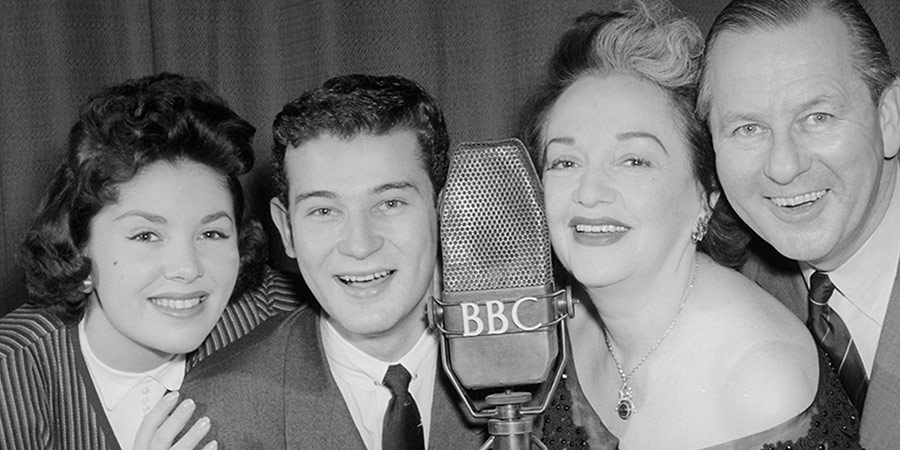
Life With The Lyons was another favourite in our house. It revolved around a real life American showbiz family living in London: Ben Lyon and Bebe Daniels (an early Hollywood star) with their two grown-up children Barbara and Richard (who was adopted). Credit must go to Ben and Bebe as they were already resident in England in 1939 and refused to return to America when the war started, determined to see it out even through the Blitz. They cheered the British public through this awful period with their earlier radio series, Hi-Gang!, which ran from 1940 to 1949. Life With The Lyons ran from 1950 to 1961, and could certainly lay claim to be one of the first family-based sitcoms - although its scripts were heavily cribbed from US radio comedies.
Clocking up some 260 episodes, it was a huge hit, with not only a television adaptation but two feature film spin-offs. Audiences delighted in the gentle humour of the trials and tribulations of family life, aided by such characters as Aggie, their "lady that does", played by the Scottish comedy actress Molly Weir.
The Clitheroe Kid was a very funny half hour about naughty 11-year-old schoolboy Jimmy Clitheroe. The star's real name - plus he really did come from Clitheroe - he was in the latter half of this thirties when the show started: a glandular condition meant he never grew taller than 4' 3" and weighed about 5 stone. Lasting for almost 300 episodes from the mid-50s to early '70s, it remains one of the longest-running radio sitcoms.
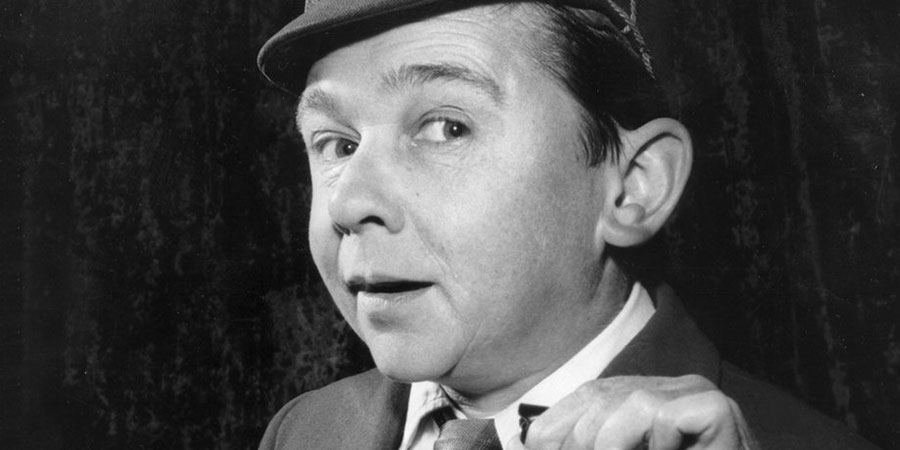
Again, the series had a family setting, but with no father in this one. Jimmy's mother and gruff Scottish grandfather disciplined him, with long-suffering older sister and her gormless boyfriend Alfie Hall (played by the very underrated Danny Ross) completing the mix. Jimmy would get into various scrapes and schemes (often with the aid of a reluctant Alfie), usually involving getting his mate Ozzie Higginbottom into trouble. Ozzie's father - Grandad's drinking mate - would threaten to give Jimmy a good hiding (with Grandad's consent) whenever he got Ozzie into hot water!
Jimmy did have one obscure catchphrase, confusing a lot of people: "I'm all there with me cough drops" - apparently a Lancastrian expression for someone quick-witted, but his main refrain, which usually referred to Alfie, ever slow on the uptake of Jimmy's schemes, was "Don't some mothers 'ave 'em!". That should ring a bell!
There were a few other wonderful comedies that have been lost in the mists of time for me, but two final titles I adore just as much today as I ever did as a child. I still laugh out loud, never tiring and listening to both on a regular basis: The Goon Show and Hancock's Half Hour. When I listen to these (with eyes closed or not), I don't see three or four people standing around a microphone - I'm there witnessing the goings on as clear as anything I've seen in real life...
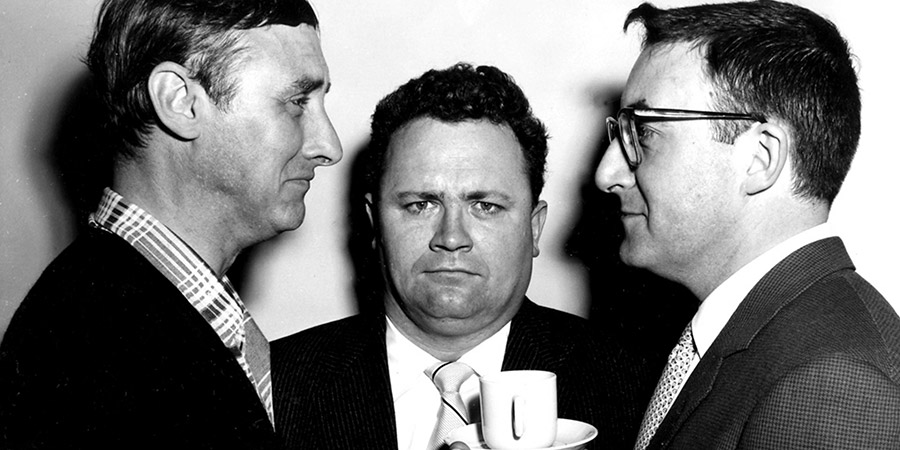
... I can easily picture three characters alternately climbing on each other's shoulders, scaling the wall of a dungeon to escape through a high window, as star/writer Spike Milligan observes "Let them try doing this on television".
The two other main stars were of course Peter Sellers (playing many, many parts) and Harry Secombe, usually as Ned Seagoon. Even the show's announcer, Wallace Greenslade, got involved with their tall stories, and there were excellent guest appearances from the likes of Bernard Miles, Dennis Price and Valentine Dyall.
Unlike shows we know today, and harking back to then long-established radio norms - perhaps oddly, given the Goons' avant-garde style - it had two musical interludes. Both Max Geldray (harmonica player) and Ray Ellington (and his Quartet) got involved in plots on occasion; especially Ray, who usually played The Red Bladder, Major Bloodnok's nemesis.
(Bit of trivia: The Goon Show episode Tales Of Men's Shirts (Series 10, Episode 2) was one of Michael Palin's eight records he chose on Desert Island Discs in 1979.)
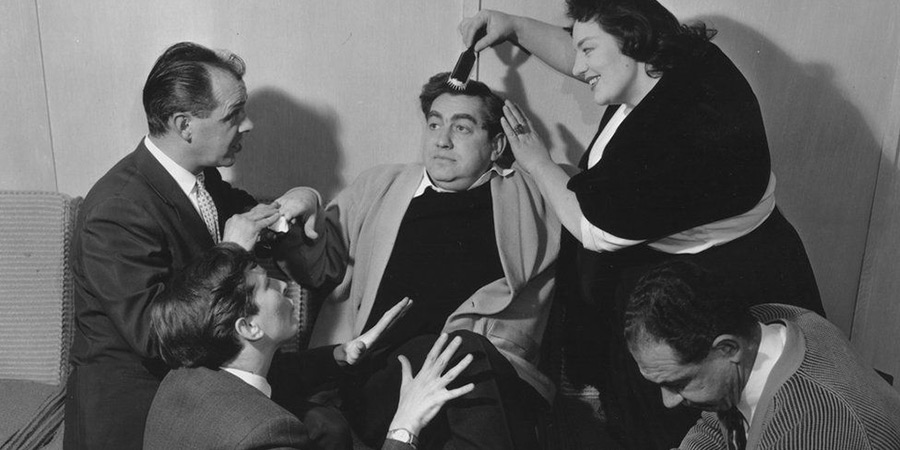
... OR I'm in East Cheam watching 'The Lad' Tony Hancock and his cohorts as they struggle through life in the late 1950s. My all-time favourite Hancock's Half Hour episode (and the one that is top of the Tony Hancock Appreciation Society's poll each year!) is Sunday Afternoon At Home. Apparently the BBC were not keen on the programme as it "did not go anywhere", but that is of course exactly the point. The utter, sheer boredom of a Sunday afternoon in post-war Britain when everywhere was closed was something everyone knew. Many is the time I was like that - forlorn.
So I'm listening, and finding myself sat in a rickety old wing-backed chair in the corner of the lounge at 23 Railway Cuttings, "watching" as Tony, Sid James, Bill Kerr and Hattie Jacques (as Griselda Pugh - Hancock's Girl Friday) implode - wonderful performances topping off brilliant observation by writers Ray Galton and Alan Simpson. The Monopoly set with no board (you can lose pieces, yes - but how do you lose the board!), the locked piano, the wind-up gramophone with worn out spring, the Sunday dinner with static gravy, filling in the looped letters with a pen in the newspaper, finding faces in the wallpaper that only you can see, and then to top it all, the bored neighbour Clint (Kenneth Williams) comes in as his wife told him it was all happening in the Hancock abode!
My own interest in radio faded in the late 1950s as television came to the fore, and I was of an age to begin noticing those other giggly teenagers who wore skirts.
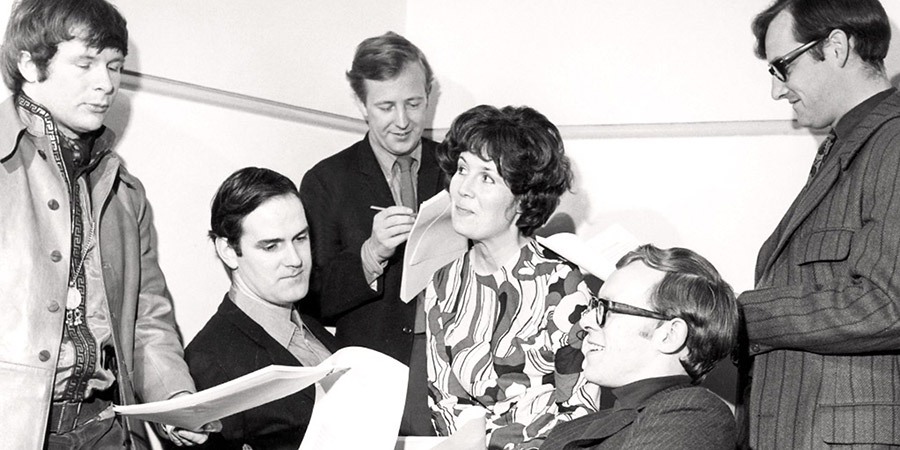
Once married and settled down, I did return to radio. One Saturday tea-time in the mid-60s my attention was drawn to a new (or revived?) sort of mad-cap humour, in the shape of sketch show I'm Sorry, I'll Read That Again. Featuring the likes of Graeme Garden, Tim Brooke-Taylor, Bill Oddie, John Cleese and Jo Kendall, with the assistance of announcer David Hatch, it would run for more than 100 episodes between 1964 and 1973.
ISIRTA in turn gave way to the unscripted, timeless hit panel show-cum-quiz-game ISIHAC (I'm Sorry I Haven't A Clue), which continues to this day. Garden and Brooke-Taylor stayed on, adding Barry Cryer, and usually a guest to their line-up; along with the last person you would think of as a chairman - jazz man Humphrey Lyttelton, and what an inspired choice he turned to be! In a not dissimilar mould was Just A Minute with chair Nicholas Parsons, another enduring hit that reached its 1,000th episode at the start of 2024.
I have many, many recordings of these classic steam radio series across CD, cassette and reel to reel tape, which I still listen to to this day. They represent a humour that for me will never die, a lifetime of memories, and a source of endless fun. They remain as funny now as they did when I first listened to those crackling tones on the wireless 60 years ago. Do investigate some of the above and share their joy with me.
Help us publish more great content by becoming a BCG Supporter. You'll be backing our mission to champion, celebrate and promote British comedy in all its forms: past, present and future.
We understand times are tough, but if you believe in the power of laughter we'd be honoured to have you join us. Advertising doesn't cover our costs, so every single donation matters and is put to good use. Thank you.
Love comedy? Find out more